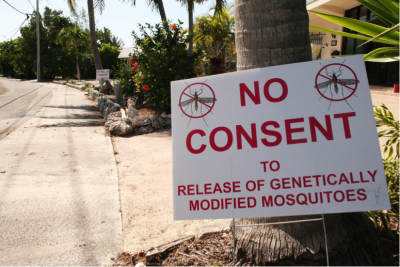FDA Subjects Floridians to GMO Experiment
- The FDA allows biotech giant to experiment in the U.S.
- GM mosquito deactivator switch rendered useless by common drug. Find out more…
- Discover how a tiny fish could be facing a GMO-heavy diet and how it may affect you.
Dear Reader,
“Yikes, the mosquitoes are really bad out here! It’s time to get some more fish.”
When I was a kid, I would spend my summers at a camp in the Florida Keys. I always noticed that the mosquitoes would get more intense toward the end of the sessions.
And one day, I finally figured out why… we needed more fish.
The Keys are full of areas with standing water –the perfect breeding ground for mosquitos.
And for many years, residents have reduced the numbers of these troublesome vectors with a safe, natural and effective solution – tiny fish called gambusia.
Gambusia can live in murky water and never need to be fed, because they eat mosquito larvae. This means they kill mosquitoes before they have the chance to become full-grown, disease-carrying menaces.
And luckily for Keys residents, these fish are easy to get…
If you have standing water, simply call the Florida Keys Mosquito Control District and they will bring you some of these minnow-sized fish.

Some areas of the Keys have gambusia channels. These areas were specifically designed to attract breeding mosquitoes so that the stocked gambusia could eat their larvae. Source: conchscooter.blogspot.org
Then just let these tiny assassins do their thing and violà, your mosquito situation is under control
But due to another poor and dangerous decision by the FDA, it looks like these little bug crushers are going to have some competition in the mosquito population control game.
Some genetically modified competition, to be exact.
![]() FDA Greenlights GMO Menace
FDA Greenlights GMO Menace
Last week, the FDA announced it’s approved the experimental release of genetically modified mosquitoes in the Florida Keys.
Releasing these winged mutations has been a possibility for this group of tiny islands for a couple of years, and even with strong community resistance, it’s now a reality.
Oxitec, a British biotech company, has been itching to get these GM mosquitoes into the Keys for years and are looking forward to unleashing these mutants into the environment.
And seems it like the first U.S. case of locally transmitted Zika virus was just the catalyst the Feds needed to greenlight their project.
The GM mosquitos are members of the Aedes aegypti species that carries Zika and other infectious diseases like chikungunya, dengue fever and yellow fever.
Male mosquitoes are unable to bite and will not be able to spread diseases. Furthermore, their greatest “feature” as highlighted by Oxitec is a special protein they are implanted with that will kill any offspring they create with wild female mosquitoes before they reach adulthood.
However, that does mean that these offspring may survive long enough to become part of the food chain.
These mosquitoes have already been released in Brazil, the Cayman Islands and Panama, but long-term environmental effects still remain unknown. And lots of folks are curious if it might affect their health directly.

Kieys neighborhoods show their resistance to the GMO experiments going on in their backyards. Source: NPR.org
For instance, the tiny gambusia fish eats mosquito larvae, and birds eat the gambusia and adult mosquitoes, and alligators eat birds, and people eat alligators. But it’s unclear if the GM mosquitoes moving up the food chain will have any negative health effects on animals and humans alike.
But what’s more frightening, the introduction of these mosquitoes is irreversible. Once they are out there, we won’t be able to find them if we discover they can cause problems in the future.
Oxitec reports that this is not a worry because the mosquitoes cannot breed.
But that’s not entirely true.
A report Oxitec released in 2012 reports that the GM mosquitoes have a 15 percent survival rate when a common antibiotic, tetracycline, is present in the environment. This is because the antibiotic can bind to their modified gene and inactivate it. This means their self-destruct function will never turn on.
Even a very tiny amount can repress the lethal protein. Since antibiotics are so prevalent, it’s quite likely some of these mosquitoes will thrive and could even create more wild mosquitoes in the right circumstances.
As for the residents of the Florida Keys, thousands of them aren’t thrilled about the FDA’s decision. A Change.org petition gathered 160,000 names after being started by Key West resident Mila de Mier. Many residents are upset that the experimental process is being carried out in their backyards – a fear they’ve never had with gambusia.
For now, because of emerging Zika cases, Keys residents and everyone else should protect themselves from mosquitoes, GMO or not.
Live well,

Natalie Moore
Managing editor, Living Well Daily Insider
Sources
[1]
Some Small Native Freshwater Fish Recommended for Mosquito and Midge Control in Ornamental Ponds
[2] What kind of fish do you put in standing water, how do I get them?
[3] Eliminating tetracycline contamination
[4] Genetically Modified Mosquito Study in Florida to Halt Spread of Viruses Sparks Eco Debate
Written By Natalie Moore
Natalie Moore is a dedicated health researcher with a passion for finding healthy, natural, and science-based solutions. After a decade of direct healthcare experience in western and natural medicine, she was involved in public health research before joining Living Well Daily.
View More Free Articles
This Sleep Mistake Is Doubling Your Disease Risk
Think your inconsistent bedtime is just a harmless habit? Think again. New research reveals that going to bed at different times each night isn’t just making you tired—it could be dramatically increasing your risk of serious diseases. But the key to making sure poor sleep doesn’t derail your health goals likely isn’t what you think…....
Stop Obsessing Over Diet Trends
Can we stop with the endless diet debates already? Every other week there’s a new headline shouting about which diet is best for weight loss, heart health, or diabetes. Paleo, keto, low-carb, high-protein… it’s exhausting. And now, a new meta-analysis is out comparing the Mediterranean diet, the DASH diet, and something called AHEI (that’s “Alternative...
A New Reason to Ditch Processed Junk
If you’ve ever walked the inside aisles of your local grocery store and thought, “This is all just junk,” your instincts were spot on. A new study published in the journal Thorax just added another red flag to the list of dangers linked to ultra-processed food—a 41 percent higher risk of lung cancer. That’s right....
When Being Winded on Stairs Is Serious (And When It Isn’t)
I had an athlete visit me recently because he experienced shortness of breath while climbing stairs. He is in great shape, so he was worried about what it might mean. “Doc,” he said, “I run five miles three times a week. Why am I huffing and puffing after two flights of stairs?” His concern is...
Study EXPOSES Hidden Danger Lurking in Your Car
We think of our homes and cars as safe havens. But according to a startling new study, they may be flooding your lungs with microscopic plastic particles—every single day. Researchers in France recently found that adults inhale an average of 68,000 microplastic particles daily from indoor air alone. To put that in perspective, that’s about...
Mailbag: Is Modern Food Making You Snore?
“What can cause snoring, and is there a way to correct this issue?” —Seeking Silence Hi Seeking, Snoring happens when the soft tissues in your throat relax and vibrate as air passes through during sleep. While several factors can cause snoring—from sleep position to nasal congestion—I want to share one trigger that might surprise you....
Simple Food Swap SLASHES Dementia Risk 28%
Let’s be honest… who would jump at the chance to cut their dementia risk by 28 percent. And no, you don’t need to run marathons, survive on broccoli, or learn to play the zither (whatever that is) to make it happen. All it takes is one easy swap—something that’s probably already in your refrigerator. Researchers...
This SMART Floss Exposes Hidden Health Danger
Scientists have created dental floss that doesn’t just clean between your teeth—it also tracks your stress while you’re flossing. Now, I know what you’re thinking… “Great—now even flossing is going to stress me out by telling me how stressed I am.” But this fascinating new tool from Tufts University could be a game-changer for understanding...
Is This "Safe" Sweetener Damaging Your Brain?
The headlines are alarming… “Popular Sugar Substitute Linked to Brain Cell Damage” and “Erythritol Could Damage Critical Brain Barrier” are just two of the dozens I’ve spotted recently. But before you toss every sugar-free product in your pantry, let’s take a closer look at what this study actually shows—and what it doesn’t. The latest research...
This Summer Threat Could SPIKE Your Blood Sugar
Picture this… It’s another scorching hot summer day. You crank up the air conditioning while watching the weather forecast, which predicts yet another “record-breaking” heat wave. It’s starting to feel like just another miserably uncomfortable summer. But what you might not realize is that—if you have diabetes—those rising temps could do far more damage to...









